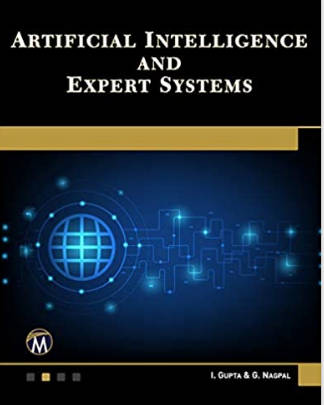Authors: I. Gupta & G. Nagpa
Publisher: Mercury Learning
Pages: 412
ISBN: 978-1683925071
Print: 1683925076
Kindle: B087785GZM
Audience: Technically able readers
Rating: 4
Reviewer: Mike James
Expert Systems, anyone?
Today most of the fuss about AI is centered on neural networks and machine learning. What seems like a long time ago now, when neural networks weren't really a practical proposition, an alternative form of AI called symbolic reasoning or something similar was the great hope. Expert systems were a main part of this idea. The theory was that you could capture the expertise of a human domain expert as a set of rules and then let a program use those rules in place of the expert. After the initial the hype, it faded out of headline news and slowly receded into the distance. Its decline was mainly because it turned out to be very difficult to capture the knowledge of experts and when you did there were very real problems in applying it in a consistent way.
All of this said, there are still applications that are best approached from this point of view. They may not be as headline hitting as neural network applications, but they are potential money earners and savers. If you want to know more then this book is about expert systems and the ideas that surround them.
The book starts off with a look at basic ideas, in particular the Turing test. Then in Chapter 2 considers what sort of problems AI tries to solve. At this point my hopes for the book took a turn for the worse - it was reading like a superficial account suitable for managers and other people who need to pretend to understand the technology - but I was wrong.
Chapters 3 and 4 are on search strategies and while it isn't suitable for the complete beginner, it is a good summary for a refresher course. It, like the rest of the book, takes the form of quiet dense point by point summaries. As long as you have a technical background you should find this useful.

Chapter 5 is where expert systems proper start and we have a basic but rapid introduction to the idea of rules and how to make use of them. Chapter 6 deals with the less interesting problems of the development cycle. The problems of knowledge acquisition are covered in Chapter 7, but I don't think with enough emphasis on how difficult it really is. There is no consideration of uncertainly in rules. Chapter 8 deals with how to represent knowledge and this touches on logic and reasoning.
Sadly Chapters 9 and 10 introduce neural networks - and the coverage isn't deep enough to make them worth including. It is limited to a basic introduction that might give you some idea of where to go next.
Chapters 11, 12 and 13 are about fuzzy logic and how to use it as a stand-in for probability in expert systems. This is a good basic introduction to a simple but clever idea. It is a shame that there isn't room to consider alternatives.
The final two chapters are on logic programming and Prolog. This is another of the subjects that had its heyday a while ago and doesn't deserve to be as forgotten as it currently is.
Verdict:
This book is not a gentle introduction to AI or expert systems. It is mostly sets of topics described using lists of ideas. There are some general discussions, but the presentation quickly reverts to bullet point lists of things you should know. If you like this sort of approach then this will be useful. Overall it's quite good if you want a quick introduction to some almost forgotten topics in AI and are prepared to so some work to find out more if you need to. A useful but not essential book.
For more recommendations of books in this area see AI Books To Inspire You in our Programmer's Bookshelf section.
To keep up with our coverage of books for programmers, follow @bookwatchiprog on Twitter or subscribe to I Programmer's Books RSS feed for each day's new addition to Book Watch and for new reviews.
Foundational Python For Data Science
Author: Kennedy Behrman
Publisher: Pearson
Pages:256
ISBN: 978-0136624356
Print: 0136624359
Kindle: B095Y6G2QV
Audience: Data scientists
Rating: 4.5
Reviewer: Kay Ewbank
This book sets out to be a simple introduction to Python, specifically how to use it to work with data.
|
ChatGPT For Dummies
Author: Pam Baker
Publisher: For Dummies
Pages: 176
ISBN: 9781394204632
Print: 1394204639
Kindle: B0C63LZ6DN
Audience: Everyone
Rating: 4
Reviewer: Ian Stirk
This book aims to introduce you to ChatGPT, how does it fare?
| | More Reviews |
|

